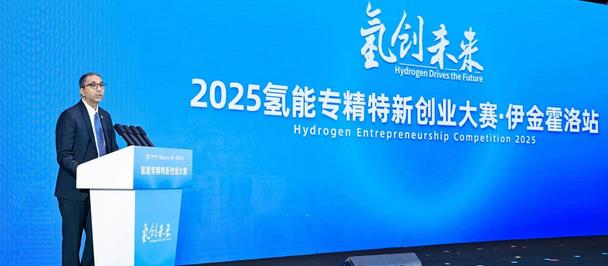UNDP Resident Representative in China Beate Trankmann delivers opening remarks
Foshan, December 8– The 2021 UNDP Hydrogen Industry Conference was kicked off today in Foshan city, China.
The 2-part conference is themed ‘A Hydrogen Future for A Net Zero World’, aiming to seize the momentum from the UNFCCC COP 26 and China’s carbon pledges to further discussions surrounding expansion of a green hydrogen economy. Specifically, it provides a platform for policy makers, businesses, and academics in various sectors to exchange ideas on hydrogen-based solutions to advance progress towards net zero and fulfillment of climate commitments.
With guidance from the National Development and Reform Commission and the National Energy Administration, this conference is jointly hosted by the United Nations Development Programme (UNDP) and China Center for International Economic and Exchange (CCIEE).
As a versatile energy carrier, hydrogen can be produced from renewable energy and help to curb carbon emissions in a range of hard-to-abate sectors. The Chinese government has issued a series of policies and plans in efforts to achieve its climate targets, including high-level signals such as in the 14th FYP, where it clearly outlined the goal of advancing its hydrogen industry.
Mr Sun Zhiyan, Vice Governor of Guangdong Province acknowledged in his opening remarks UNDP’s years of in-depth support to China’s hydrogen and fuel cell vehicle development. He noted that Guangdong Province will harness its first-mover advantage, improve its policy framework, focus on research and development, drive coordinated development of the sector in and across regions, as well as strive to further reduce cost across the hydrogen value chain.
“Building on the momentum from the important 2030/60 carbon pledges put forward by President Xi Jinping and China’s updated commitments under the Paris Agreement, it will be key to fully harness the potential of clean hydrogen as it can offer zero carbon solutions to help transform high-emission sectors,” said Beate Trankmann, UNDP Resident Representative in China.
During the opening ceremony, UNDP shared its experience on facilitating Fuel Cell Vehicle (FCV) demonstration and building a hydrogen economy in China. These best practices and lessons learnt can be further replicated and adapted to other developing countries as they search for their own pathways toward energy transition.
In addition, UNDP’s hydrogen economy vocational academy demonstration project was launched during the conference, striving to enhance the technical vocational education and training (TVET) system for the hydrogen industry, and nurture the talents needed across the hydrogen value chain. The event celebrated and welcomed the academy’s first intake of students in 2021.
The conference also included thematic forums to conduct in-depth discussions on fuel cell technology, hydrogen technology, policy standards, hydrogen safety, and hydrogen energy cooperation. In the afternoon, a discussion was held between top-notch researchers on technological frontiers in the further development of hydrogen technologies.
“China should maintain an integrated planning approach and push for sustainable and orderly development, while take a firm grasp on institutional reform and technological innovation to accelerate the hydrogen industry development,” said Zhang Xiaoqiang, Executive Vice Chairman of CCIEE. “International cooperation will also be critical for faster development of hydrogen.”
The Closing Plenary of the conference will be held on 23 December in combination with a High-Level dialogue with line ministries to further discuss hydrogen industry development in China. This second part of the conference will also include a video message from UNDP Administrator Achim Steiner, and a roundtable discussion to enhance the cooperation between China, Japan and South Korea on hydrogen energy
UNDP has been supporting the demonstration and commercialization of hydrogen and fuel cell vehicles (FCV) in China over the past 18 years, in close collaboration with the Ministry of Science and Technology (MoST), with funding from the Global Environment Facility (GEF).
Currently, there are more than 7,800 FCVs and 173 hydrogen refueling stations in China. UNDP will continue to advise the development of China’s renewable-based hydrogen economy including by piloting hydrogen solutions and vocational training. UNDP’s focus will be on making hydrogen cleaner and cheaper, boosting innovation and investments in the sector, and enhancing international cooperation – three critical steps to accelerating the adoption of hydrogen as a clean fuel in energy systems and helping China move towards a net-zero pathway.
---
For more information and interview requests, please contact:
Beijing: Yue Zhao, yue.zhao@undp.org

 Locations
Locations



